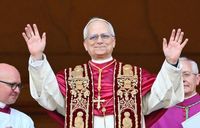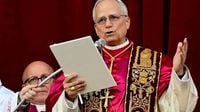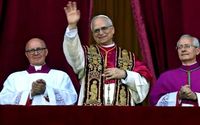In a historic moment for the Catholic Church, Cardinal Robert Francis Prevost has been elected as the first American Pope, taking the name Leo XIV. The announcement followed a conclave that lasted two days, concluding with the sight of white smoke rising from the chimney of the Sistine Chapel, signaling that the 133 cardinal electors had reached a two-thirds majority vote. This pivotal moment took place on May 8, 2025, shortly after noon Eastern Time.
Canadian Prime Minister Mark Carney welcomed the election, stating, "The white smoke rising above the Sistine Chapel marks the beginning of a new papal reign — a moment of renewal, hope, and unity for over a billion faithful worldwide." Carney expressed eagerness to collaborate with the new Pope to build a world grounded in solidarity, justice, and resilience.
Conservative leader Pierre Poilievre also congratulated Cardinal Prevost, acknowledging the Catholic community's significant role in shaping the Canadian experience. He remarked that this day should serve as an occasion to recognize that influence.
Quebec Premier François echoed similar sentiments, calling the election of Pope Leo XIV a significant moment for Catholics both in Quebec and globally. He noted, "Quebec maintains a special connection with its Catholic heritage, which has profoundly shaped our history." The President of the Canadian Conference of Catholic Bishops expressed eagerness to work closely with the new Pope, reflecting a sense of optimism within the Church.
Prevost, aged 69, is a missionary who has dedicated much of his life to serving in Peru. He is known for his humility and sensitivity, and he has been described as a person who listens before speaking. Bishop William McGrattan of Edmonton, who has met Prevost several times, remarked that he is a reserved individual who embodies a pastoral approach.
During his inaugural address, Pope Leo XIV emphasized the importance of dialogue and unity, stating, "God loves us, God loves you all, and evil will not prevail." He called for the construction of bridges through conversation, urging people to unite as one in peace. This message resonates with the challenges faced by the global community, marked by various conflicts and crises.
Prevost's election comes as a transition from the papacy of Jorge Bergoglio, who passed away on April 21, 2025. Prevost was created a cardinal in 2023 and held key positions in seven dicasteries, including the powerful Dicastery for Bishops, which he led since 2023. His leadership in this role was characterized by a focus on appointing bishops who reflect the needs of the Church today.
Born on September 14, 1955, Prevost grew up in the South Side of Chicago and was deeply involved in his local parish. He pursued his education at Villanova University, obtaining a degree in mathematics before being ordained as a priest in 1982. His missionary work in Peru spanned two decades, where he became well-acquainted with the challenges faced by marginalized communities.
Prevost's journey as a leader in the Church has been marked by his commitment to social justice and the needs of the poor. He has been described as a moderate and pragmatic figure, capable of bridging divides within the Church. His election has sparked excitement and curiosity among the faithful, as he represents a new chapter for the papacy.
In 2022, Pope Francis entrusted Prevost with a groundbreaking reform aimed at increasing women's representation in the Church's decision-making processes. This initiative reflects Prevost's progressive approach and willingness to adapt to the evolving landscape of the Catholic Church.
Despite his extensive experience, Prevost's election was not without controversy. Allegations regarding his handling of sexual abuse cases involving priests in both Peru and the United States have surfaced. Critics have raised concerns about his past management of these sensitive issues, suggesting that his election may overlook significant challenges within the Church.
Nevertheless, many believe that Prevost's unique background and experiences will enable him to navigate these complexities effectively. As a leader who has spent much of his life serving in the global south, he brings a fresh perspective to the papacy, one that prioritizes compassion and understanding.
Prevost's ability to communicate in multiple languages, including English, Spanish, Portuguese, Italian, and French, positions him well to engage with a diverse global audience. His commitment to fostering dialogue and building relationships will be crucial as he leads the Church into a new era.
As the Catholic Church faces numerous challenges, including declining attendance in some regions and growing secularism, Prevost's leadership will be closely watched. His call for unity and peace resonates deeply in a world often marked by division and strife.
In summary, the election of Pope Leo XIV marks a significant moment not only for the Catholic Church but also for the broader global community. With his emphasis on dialogue, compassion, and social justice, Prevost's papacy may indeed reflect a new direction for the Church, one that seeks to address the pressing issues of our time while remaining rooted in its rich traditions.






